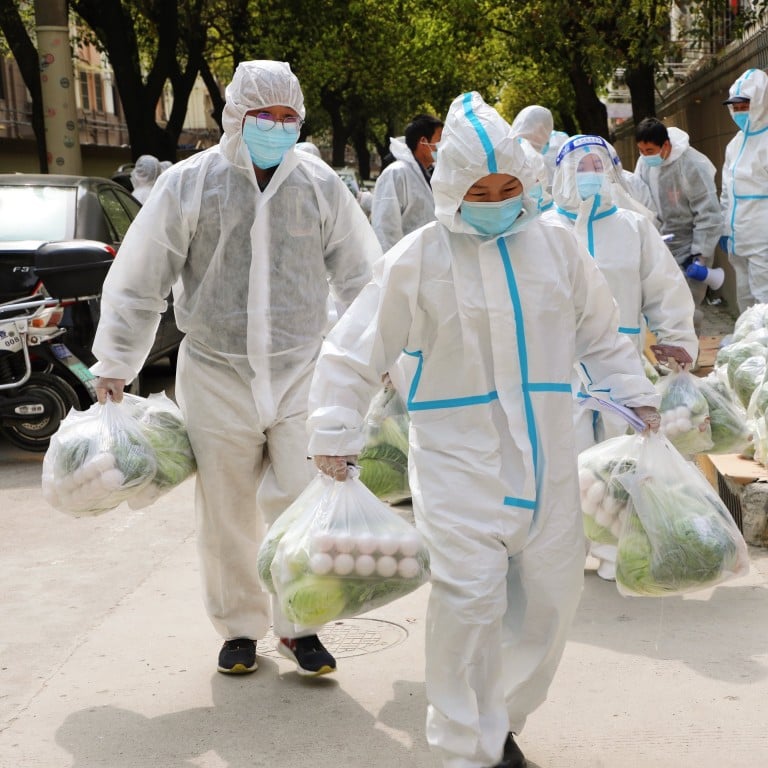
Shanghai’s key chip factories look to ensure production and deliveries as city comes under phased Covid-19 lockdown
- The Pudong New Area is home to a number of factories from leading chip businesses, such as SMIC and Hua Hong
- The local government has allowed companies to operate either under a ‘closed loop’ system or allow their employees to work-from-home
Chip factories located in the semiconductor-manufacturing area of Shanghai are scrambling to ensure production and delivery after the city imposed a strict, phased lockdown from Monday to battle an outbreak of the Omicron variant of Covid-19.
Chip companies to the east and south of the Huangpu River, placed under lockdown from Monday until April 1, are facing varying degrees of disruption to their workflow and supply chains, although operations at some of the area’s largest companies remains normal, according to company statements and analysts.
The Pudong New Area is home to a number of factories from leading businesses such as Semiconductor Manufacturing International Corp (SMIC) and Hua Hong Semiconductor. Meanwhile, suburban Songjiang houses factories belonging to Taiwan Semiconductor Manufacturing Company (TSMC), the world’s largest contract chip maker.
TSMC told the Post on Monday that there was no impact on production currently, and the company was cooperating with the government. Its Songjiang factory is one of its six 8-inch wafer fabs in the world and the only one on the mainland, according to the company’s website.
SMIC, China’s largest semiconductor manufacturer, said in an online discussion with investors on Monday that the company’s production and operations remained normal with government support. The company recently revealed its plan to build a new 28-nanometre fabrication plant in the Lin-Gang Pilot Free Trade Zone, which is a part of Pudong, to address a global chip shortage.
Foundries like TSMC and SMIC may already have prepared for potential disruption to employment and inventory, before being informed by the government about lockdowns, according to Lucy Chen, vice-president at Taiwan-based Isaiah Research. “We expect the fabs may quickly raise their capacity and utility rates after the situation recovers, assuming the lockdown only lasts four days,” she said.
Wang Lifu, a Shanghai-based analyst at semiconductor consultancy ICWise, said semiconductors were one of the areas that Shanghai will look to protect. “Some engineers are expected to live and work on the factory floor for over a week,” said Wang.
The city’s government has allowed all companies in lockdown-affected areas to operate either under a “closed loop” system or allow their employees to work-from-home. Some companies in Pudong have adopted a shift system for R&D staff and sealed off key production personnel at factories, according to local authorities.
The company has three 8-inch wafer fabs in Shanghai Jinqiao and Zhangjiang, with a monthly production capacity of about 180,000 wafers, according to its official website.
However, persuading workers to remain at the factory and keeping cargo flowing comes with higher operational costs, particularly for some smaller-scale chip makers.
Production costs are expected to rise, mainly due to logistics and transportation costs and employee subsidies for anti-epidemic purposes, according to ICWise’s Wang. Some companies have had to pay twice the daily salary for front-line operators to work in isolation at factories, said Wang.
Taiwan-headquartered ASE Group, a provider of semiconductor testing and packaging services with a factory located in the Zhangjiang High-Tech Park, expects logistics costs and “employee care” costs to climb due to the lockdown, with a limited impact on revenue, according to Chinese media reports.
Wafer Works, also headquartered in Taiwan and with a silicon wafer factory in Shanghai’s Songjiang district, said that shipments may be affected although the workforce and production at its plant remains normal. Its monthly production capacity in Shanghai is 150,000 pieces of small-size silicon wafers, and this is expected to increase to 250,000 pieces in 2022, according to the company.
Uncertainty remains though, as confirmed cases in the city surged on the second day of lockdown and as the daily number of asymptomatic cases reached a record 4,381. “In the long term, [the impact] will depend on the Covid-19 situation and government policies,” said Isaiah’s Chen.
Additional reporting by Che Pan

